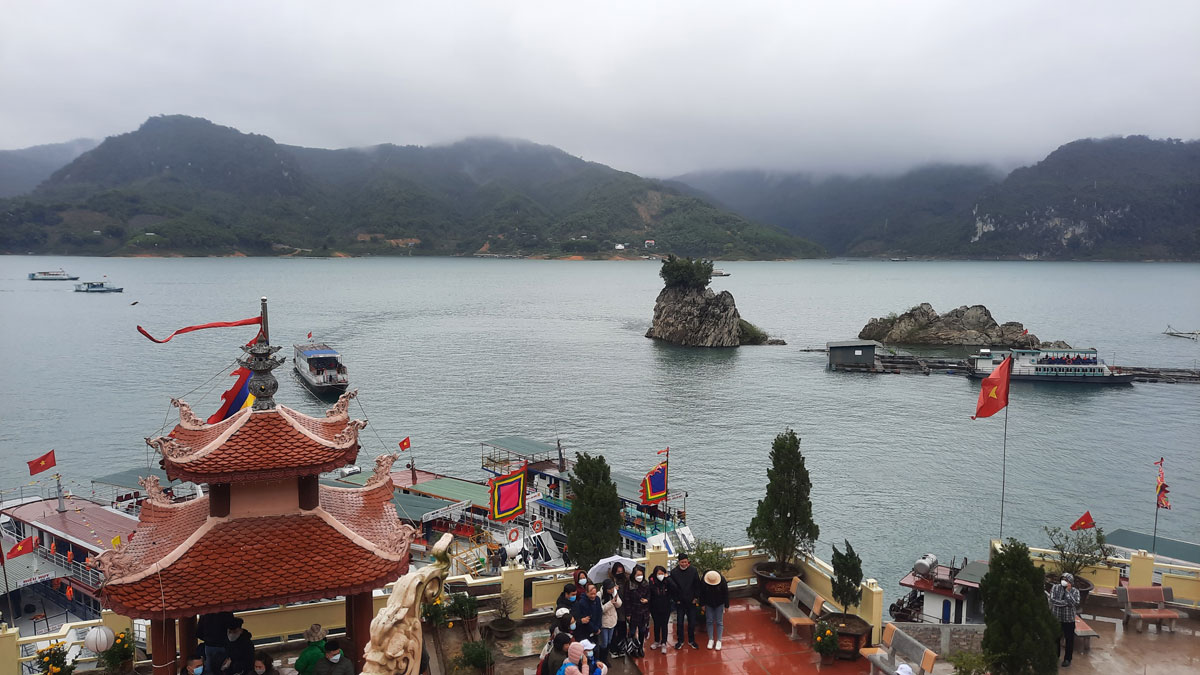
(HBO) – The development of a master plan of Hoa Binh province for 2021-2026, with a vision to 2050 is considered one of the four strategic breakthroughs in the realization of the 17th provincial Party Congress’s Resolution. While it is an urgent task, the quality of planning must be ensured in accordance with the new Law on Planning, thereby creating motivations to attract investment resources for sustainable development.

The master plan defines the development of
tourism on Hoa Binh Lake in association with sustainable environmental
protection.
On April 2, 2021, the province decided to establish a
steering committee for building the master plan of the province led by the
Secretary of the provincial Party Committee. The process is divided into five
phases, with phase one focusing on data collection and assessment of current
situation and phase two on developing the draft master plan. In phase three,
the draft will be put on table, and then be revised in phase four. Finally, it
will be submitted to the Prime Minister for approval in accordance with Article
35 of the Law on Planning. The province has basically completed the second
phase.
There are difficulties during the planning
making process because the national and regional master plans have not yet been
approved. The lack of information and orientations is also a problem.
To improve the quality of the planning work and
ensure that it is in conformity with provisions of the laws, the provincial
steering committee asked relevant agencies and People's Committees of districts
and cities to raise their responsibilities and provide detailed and accurate
data for the consulting unit.
It is necessary for tourism planning to reflect
the province's advantages in terms of location, environment and culture.
Attention should be paid to Hoa Binh lake as well as strategic tourism areas
such as Kim Boi and Yen Thuy hot springs in association with homestay and other
outdoor activities including trekking.
Hoa Binh has set a target of becoming a luxury
resort destination in the region. However, the development of the tourism
industry will be attached to environmental protection, development of
transport, electricity, clean water supply, telecommunications systems,
high-quality human resources as well schools, hospitals, commercial centers,
and amusement parks.
As for industrial planning, an area specializing
in furniture materials should be established to attract high quality human
resources from the capital city of Hanoi.
Regarding investment attraction, the focus
should be on projects that prove to be effective, generate jobs,
andcontributed to State Budget while preserving environmental
sustainability.
The province is planned to be an area that
provides green agricultural products at affordable prices, processing
high-quality farm produce to Hanoi. Attention will be paid to high-tech
agriculture, protecting the environment and growing medicinal plants under the
forest canopy.
The provincial Department of Planning and
Investment is assigned to coordinate with relevant agencies and units to
complete the planning and submit it to the Prime Minister by August 31, 2022./.
The Standing Board of the Hoa Binh provincial Party Committee has agreed in principle on a proposal by the Standing Board of the Party Committee of Hoa Binh city to gather feedback on the city’s 1:2000 zoning plan, which forms part of its broader urban development strategy.
Hoa Binh province has made notable progress in public administration reform and digital government development, with the satisfaction index among citizens and businesses reaching over 84%, according to recent government evaluations.
Thanks to great efforts by local authorities in recent times, the governance and public administration performance of Mai Chau district has been significantly improved.
In the afternoon of June 6, the Party Committee, the People's Council, the People's Committee and the Fatherland Front of Lac Son district solemnly held a meeting to celebrate the 139th anniversary of the district's founding (1886–2025) and the 79th anniversary of the establishment of the district's Party Committee (1946–2025). There was the attendance of Mr. Bui Van Thang, the Vice Chairman of the Provincial People's Council; Mr. Quach Tat Liem, the Vice Chairman of the Provincial People's Committee; Ms. Dang Bich Ngoc, the Deputy Head of the National Assembly Delegation of the province; as well as the former leaders of the province and district through various periods, who are the natives of the district.
Implementing the Politburo’s Resolution No. 57-NQ/TW on breakthroughs in science – technology, innovation, and digital transformation is a golden opportunity for the northern mountainous province of Hoa Binh to renew growth model, improve competitive edge and shorten digital gap.
Resolution 57-NQ/TW, issued by the Politburo on December 22, 2024, identifies sci-tech, innovation, and digital transformation as strategic breakthroughs to build a developed and prosperous nation. In Hoa Binh province, this spirit is not just a slogan, it’s being put into action through concrete initiatives that form a "new development triangle”: digital citizenship, digital economy, and digital administration.



